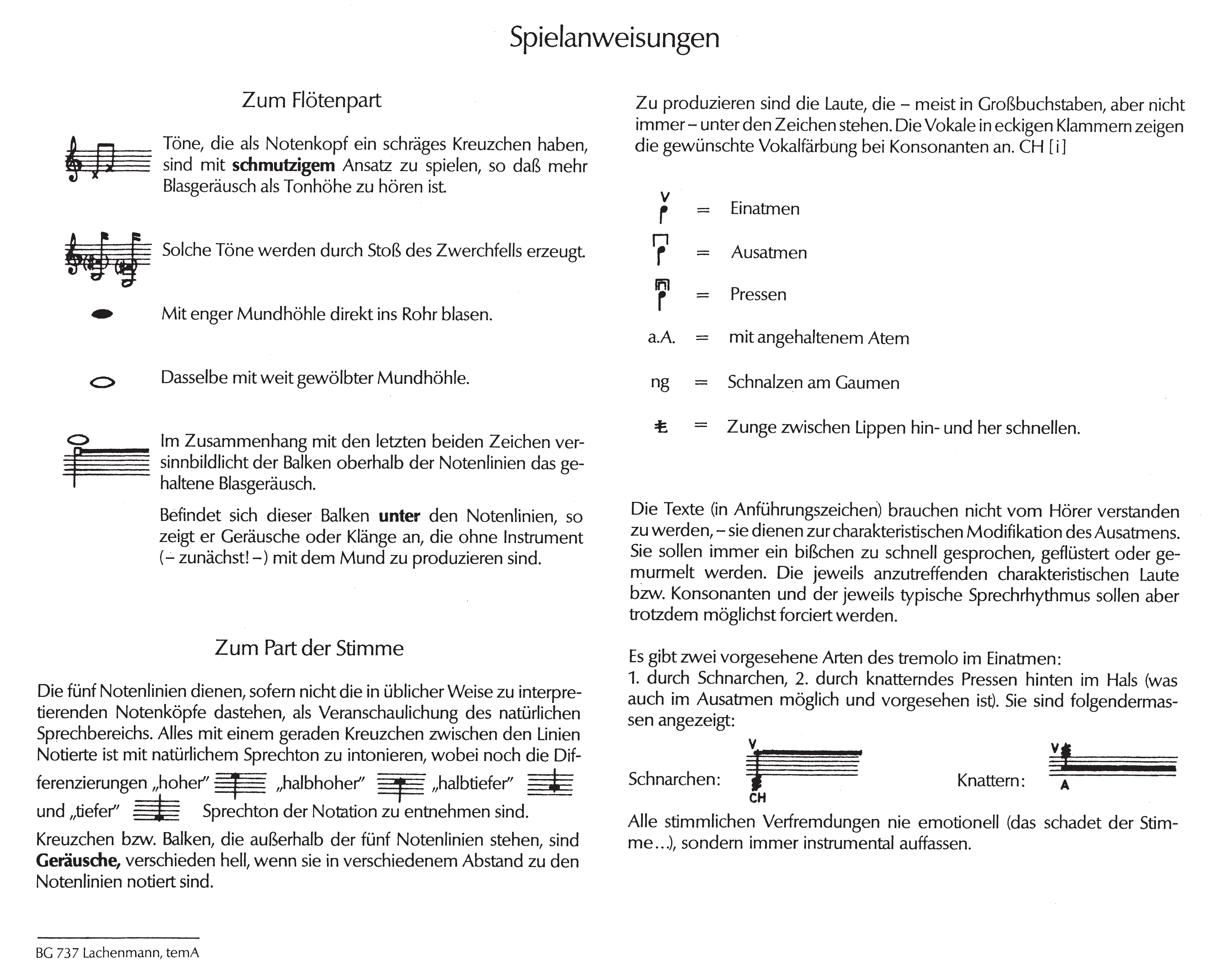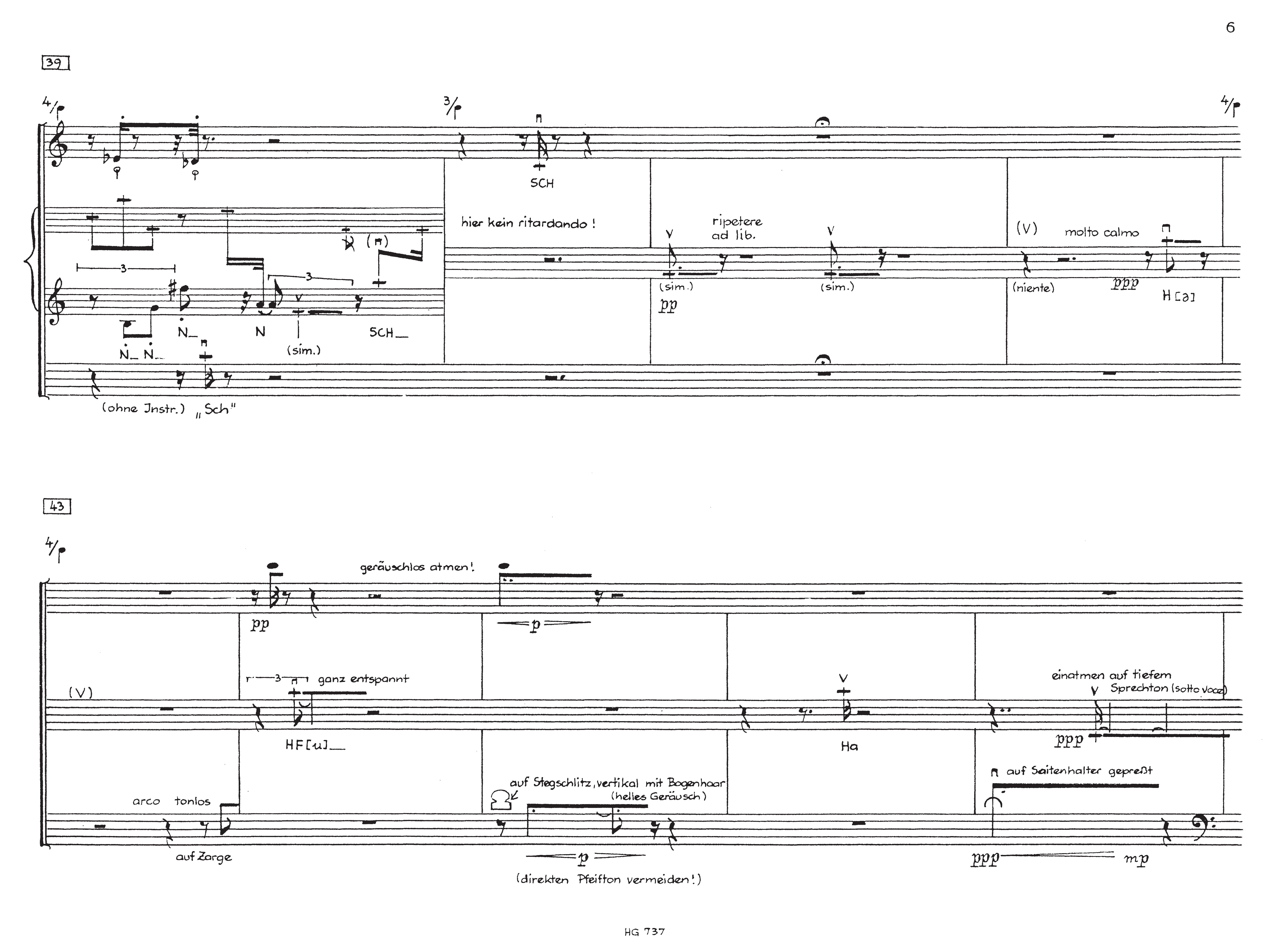temA
für Flöte, Stimme (Mezzosopran) und Violoncello for Flute, Voice (Mezzo-Soprano) and Violoncello
Spielpartitur | Performance Score
Edition Breitkopf 9459
Helmut Lachenmann
temA
für Flöte, Stimme (Mezzosopran) und Violoncello
for Flute, Voice (Mezzo-Soprano) and Violoncello
Spielpartitur | Performance Score
Edition Breitkopf 9459 Printed in Germany














temA
für Flöte, Stimme (Mezzosopran) und Violoncello for Flute, Voice (Mezzo-Soprano) and Violoncello

Helmut Lachenmann, 1968


Edition Breitkopf 9459 © 1971 by Musikverlage Hans Gerig, Köln 1980 assigned to Breitkopf & Härtel, Wiesbaden





Leseprobe Sample page




Leseprobe Sample page



Leseprobe Sample page



Leseprobe Sample page



Leseprobe Sample page

unter www.breitkopf.com entgegen.
Helmut Lachenmann
temA (1968)
Aufführungsdauer | Performing Time etwa 14 Minuten | approx. 14 minutes
Uraufführung | World Premiere
Hanna Aurbacher (mez) | Gerhard Braun (fl) | Werner Taube (vc) Stuttgart | 19/02/1969
temA dürfte – trotz Ligetis Aventures – eine der ersten Kompositionen sein, in denen das Atmen als akustisch vermittelter energetischer Vorgang thematisiert wurde (Holliger, Globokar, Kagel, Schnebel, Stockhausen schon in den Hymnen, widmeten sich unabhängig voneinander und jeweils unter anderer Perspektive demselben Phänomen). temA markiert außerdem für mich den ersten Schritt hin zu jener „Musique concrète instrumentale“, in welcher die mechanischen Bedingungen bei der Klangerzeugung in die Komposition mit einbezogen sind und welche später – in Kontrakadenz, Air, Pression usw. - noch konsequenter mein Schaffen prägen sollte. Naturalistische Grenzsituationen wurden in temA, anders als in meinen früheren Werken, bewußt akzeptiert, aber zugleich in einen streng musikalisch konstruierten Zusammenhang integriert, der so auch den traditionellen Spielaktionen neue Bedeutung geben sollte. Die Tabu-Verletzung, wie sie in den frühen siebziger Jahren, nicht nur bei diesem Stück, empfunden wurde, hatte weniger ihre Ursache im Phänomen der Klangverformung (Schnarchen, gepreßte Saiten, tonloses Blasen usw.), denn solche „Verfremdung“ wurde als humoristisches, dadaistisches oder expressionistisches Element durchaus toleriert. Der Schock hatte seine Ursache vielmehr in der satztechnischen Logik, welche die bloß surrealistische Wirkung relativierte und nicht Spaß, sondern Ernst machte.
(Helmut Lachenmann, 1983)
temA was written in the summer of 1968. In spite of Ligeti’s Aventures it may be considered one of the first compositions in which the breathing plays a role as an accoustically transmitted energy process (Holliger, Globokar, Kagel, Schnebel and Stockhausen in Hymnen have already worked on this phenomenon independently of each other and from different points of view). Moreover, temA marks for me the first step into that “musique concrète instrumentale” in which the mechanical conditions of the sound production are incorporated into the composition. This characterizes my later pieces such as Kontrakadenz, Air, Pression etc. more consistently. In temA, unlike what happened in my previous works, the naturalistic extreme cases were consciously accepted but at the same time integrated into a very rigorous musical context which was also to give a new meaning to the traditional playing conceptions. The violation of the tabus felt in the nearly 70s (not only regarding this piece) lay to a less degree in the phenomenon of the sound deformation (snoring, pressed strings, soundless blowing etc.), since such an “alienation” was perfectly tolerated as an humoristic, dadaistic or expressionistic element. Rather the shock was caused by the technical logic of the movements which rendered relative the sheer surrealistic effect and had to be taken seriously instead of in an humoristic way.
(Helmut Lachenmann, translation: Roger Clément)
www.breitkopf.com
